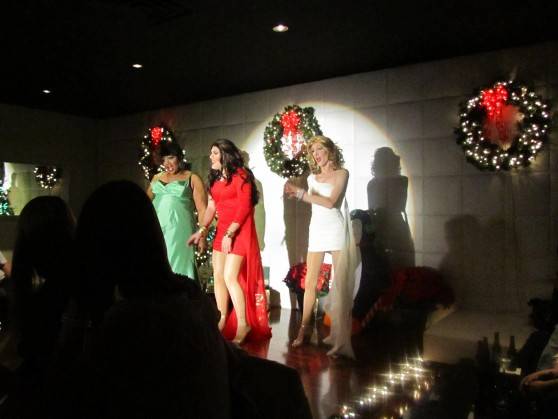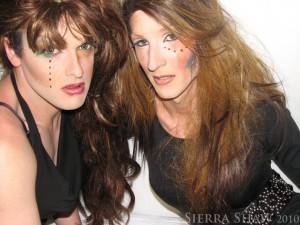I’m certainly no scholar of drag. The term, I think, stands for “dressed resembling a girl,” but that seems too easy. What I do know is that drag queens have been an enormously important part of LGBT culture since long before we began using the initialism “LGBT.”
The Stonewall Riots? The first instance in our history that the queer community began fighting back from social, cultural, and legal oppression? Drag queens started that. Drag queens led that. Drag queens stuck it out — through threats, beatings, and arrests — until the end. None other than Dan Savage has performed drag, and he also dressed in drag to bring down a bigoted politician in Washington state. These women are fierce.
 Yesterday, Smile Politely published a review of the Emerald City Divas’ holiday drag show at Emerald City Lounge. Before the show, I met with Justin Johnson, who performs as Leiloni Stars and is co-owner of L.A. Enterprises. I talked with him about his experiences as a drag performer, working in Champaign-Urbana, and his future plans for L.A. Enterprises.
Yesterday, Smile Politely published a review of the Emerald City Divas’ holiday drag show at Emerald City Lounge. Before the show, I met with Justin Johnson, who performs as Leiloni Stars and is co-owner of L.A. Enterprises. I talked with him about his experiences as a drag performer, working in Champaign-Urbana, and his future plans for L.A. Enterprises.
~~*~~
Smile Politely: Are you from C-U?
Justin Johnson: I’m from the area. I grew up in a little town called Westville, which is about ten minutes south of Danville. So I’ve been in the area my whole life.
SP: How long have you been doing drag?
Johnson: It was ten years this past April, so almost eleven now. It’s been an off-and-on experience. I’d perform for a few years and then there were a couple of years that I got out of the scene. It’s a risky business, to tell you the truth. There can be a lot of cattiness that goes on. It can be very exhausting.
SP: Your description reminds me of theater in general — the infamous egos and jealousies…
Johnson: Oh yeah. And if it’s something that you have a real passion about, you can easily get overworked too. I’d need to take a break periodically and reinvent myself and figure out who I am as Justin, and figure out who I am as Leiloni. Even though I’m the same person, there are very different entities that come from both sides.
SP: Can you talk about what it is and what it means to be a drag queen? How is that different from transvestism or someone who is transgender?
Johnson: Certainly. This won’t be a “technical” answer; it’s the way that I see it, as a drag performer. The term that I like to use is “female illusionist,” because I try to really go for the look. When people look at me I want them to think, “Wait a minute … is that a boy or is that a girl?”
We have the luxury of taking it all off at the end of the day, whereas transgender people want to live their life as who they really are. They’re going through transition or they feel they’ve been born in the wrong body. I don’t feel that way. I don’t want to alter my look through surgeries in any way. I’m very happy being a guy. I live my life outside of performances as a guy. Leiloni is just an expression of another side of me that helps me get things out and send the message that I want to send to my audience.
Transvestites are men who are comfortable being men, but they don’t want to be a drag performer. They wear women’s clothing for the sheer fact that they feel more comfortable in it. It’s clothing that they prefer to wear.
But would I go out on a normal day, as Justin, wearing a skirt and a blouse? No, probably not.
SP: So this is all about performance and art.
Johnson: Exactly.
SP: And why have you decided to perform your art in Champaign, rather than Danville? Or Chicago, even?
Johnson: Well, Danville obviously does not exactly have much of a gay scene, especially ten years ago. It’s kind of progressed some…
SP: They come here, don’t they? Gay citizens in Danville.
Johnson: Yeah, they certainly do. Danville itself, it’s very conservative. The gay scene here, especially with the University of Illinois, is so much broader. So it worked out that way.
SP: You’re a huge part of why we don’t have to go to Chicago to see shows like this.
Johnson: I’ve performed in Chicago, and I love it. But compared to here, it’s a completely different atmosphere. It’s on a much higher scale and a much higher level, which I think is fantastic because it helps me grow, but what I love about Champaign is that it has this great mixture of “big city” feel, but it’s small enough where everybody kind of knows each other. Sometimes big cities can be very hard and unfriendly, and I feel like, yes, obviously we have that every once in a while here, but Champaign is a great city. It really is. People here are so nice, and I have wonderful friends here.

Dymond-Champagne Calloway, Aurora Lamont-Carrington, and Leiloni Stars
SP: I like what you said about C-U being a small town with a big city mindset. Because I’ve lived in the opposite and it’s soul destroying.
Johnson: It really is. And also, Chicago never slows. And I like busy, but I like quiet as well. And in Chicago, it’s always go-go-go. Here, I have the chance to breathe and evolve into who I feel I should be.
SP: And what you’ve “evolved here,” the business you’ve started and the contacts you’ve made, are simply amazing. You have performers coming from all over the state.
Johnson: Thank you very much.
SP: Do you prefer the term “drag performer” to “drag queen”?
Johnson: Either one works for me. Everybody likes to feel like a queen, right? [laughs] But, I consider myself a performer, in general. The term “drag queen” to me, means a man who is obviously dressed up as a woman to give the illusion of it, but it’s obvious that it’s a man.
I will use the term drag queen or drag performer, but I usually try to go for “gender illusionist.” What I’m trying to go for, more so, is realistic, rather than a drag queen who is overemphasizing things.
SP: Like in The Bird Cage.
Johnson: Yes. Exactly.
SP: OK, and speaking of overemphasizing appearances. How do you respond to those who complain that drag queen culture stereotypes women negatively?
Johnson: I feel like … it’s one of those things … I’m obviously not a woman, so I’m taking the things that I like. I’m not saying that this is the way a woman has to look or a way that women should look; it is the way that — for me — trying to pull off that look works best. I try different things all the time, and sometimes looks just don’t work. We’re all made differently. I’ve been told by people, “You’re too pretty for a girl to look up to,” and I just respond that that’s not fair. If I uglied it down, would that be better?
SP: That’s the same mindset of when women used to dumb themselves down to get the boy.
Johnson: The whole point of being an artist is to strive for your own perfection. That’s the look that happens to work for me and what I like right now. I’ve also been told I’m too thin. This is who I am. I’m not on a diet. I work out because I need to stay healthy and dancing in heels isn’t easy. My job is cardio-heavy, and I’ve been thin my whole life.
SP: So drag performers get the same kind of rude comments that women get: You’re too skinny; you’re too fat; you wear too much make-up. Remember Calista Flockhart? If she had gained weight, she’d have been ripped apart for that too.
Johnson: Oh, certainly! Why be so judgmental? Why not appreciate something for what it is and not what you think it should be? Just because we think a thing should be a certain way, that doesn’t mean it has to be, or that it’s supposed to be. I get told, ‘eat a cheeseburger’ all the time. I’m not kidding; one of these days, Tracy, I’m going to go on stage and just eat a cheeseburger. [laughs]
SP: Wow. Wow, how rude. But then, women like me, we’re told to stop eating so many cheeseburgers. [laughs] We can’t win.
Johnson: [laughing] If people are going to judge, they’re going to, and there’s no stopping it, so … [shrugs]. But in the end, I pay attention to the people who have nice things to say. The people that I know and that I care about and that I love are those whose opinions really matter to me.
SP: Sometimes we hear complaints from some within the LGBT community that drag queens who participate in pride festivals have a negative impact, or make us look bad to those outside of our community. Are you familiar with these statements?
Johnson: I tend to block some things out. I don’t … It’s ridiculous.
SP: Yes, it is.
Johnson: And if I think something is ridiculous, I don’t really give it much of my time. That would just feed into it more.
SP: I think that these are the same people who would like to clean up all aspects of the pride festivals, and turn them into strictly “family-friendly” events.
Johnson: That’s not realistic. It’s really not. Even in the heterosexual world, not everybody wants or has kids. Not everybody is conformed to this specific demeanor of ‘class and integrity,’ if that’s what they really want to say that it is. At our pride fest we have to be more filtered, for sure. We have to consider that kids and teenagers are in the room. But these teenagers are going to be adults soon and they’re going to be exposed to all sorts of things. We can’t just cater to the kids; we want to entertain the adults as well.
We always want to worry about the greater community and we care about what they think, but no matter what, there are always going to be the naysayers, even within our own community. They have the right to feel the way they do; I’ll respect that, but I feel the way that I feel, and I hope they’ll respect that. If we don’t agree, then that’s a part of life. And those who aren’t having a good time, or it’s not their style … they’re free to leave.
SP: They need to just show up earlier in the day. I think that Kevin [Bowersox-Johnson] makes it very clear that the family-friendly atmosphere ends at 9:00 p.m.
Johnson: Exactly.
SP: So, back to the fun questions! Tell us about L.A. Enterprises.
 Johnson: Sure. It’s still up-and-coming. Me and Aurora Lamont-Carrington are best friends, roommates; we’ve lived together going on four years now. When we were first friends, I was not in the drag scene anymore. I was taking one of my hiatuses — other things needed to be taken care of — and I didn’t want to be involved with it if I couldn’t give it my all. You have to be able to throw yourself at it and concentrate on it, and I wasn’t able to do that. And he helped lift me out of that, helped me get my motivation back.
Johnson: Sure. It’s still up-and-coming. Me and Aurora Lamont-Carrington are best friends, roommates; we’ve lived together going on four years now. When we were first friends, I was not in the drag scene anymore. I was taking one of my hiatuses — other things needed to be taken care of — and I didn’t want to be involved with it if I couldn’t give it my all. You have to be able to throw yourself at it and concentrate on it, and I wasn’t able to do that. And he helped lift me out of that, helped me get my motivation back.
One day we were talking, and we thought, ‘Leiloni and Aurora … wow! Do you realize that we’re basically L.A.?’ We have a common bond with the type of look that we like to go for, which is very glamorous, Hollywood vixen/video girl/pop star, sort of thing. We get along perfectly. We’ve worked together so well over the years, and though drag isn’t exactly what we do full time right now, the more that we do it, the more it’s becoming apparent that it is going to be a part of our lives for a very long time. And we want to be able to spread that knowledge and experience for people who are up-and-coming, for people who are from other towns who want to come here and get the experience of performing somewhere other than a big city or even in their own backyards. We want L.A. Enterprises to be a safe haven for them. And we want to be able to work with other venues, as well and help them create their own drag shows. So what L.A. Enterprises is working on doing is helping entertainers and other venues come together and see what makes a good fit. We’ll help you figure out what works best for you.
 Right now we have Emerald City, which is sort of our base ground. And I’ve been starting to do some stuff with Boltini.
Right now we have Emerald City, which is sort of our base ground. And I’ve been starting to do some stuff with Boltini.
SP: Yes! With Randall Ellison, right?
Johnson: I love Randall; he is such a great guy. He really is. So easy to work with. I’ve been really good friends with Robb Tobias [the manager of Boltini] for quite a few years, and they’ve had Boys Night Out for awhile now. We’ve hosted in the past, and just recently Robb told me that he’d love to see what we could do regularly. The first one that I did was in October, and we hosted last month as well. We’re going to try to turn Wednesday’s Boys Night Out into a monthly thing.
SP: What’s it like working with Emerald City Lounge, and how did this partnership come about?
Johnson: When they first opened, quite a bit of the people working there were friends of mine. It was such a nice change, and much needed here. It’s nice to have a place to go and sit and enjoy a cocktail and have something to eat and converse with friends.
SP: And it’s beautiful in there.
Johnson: It’s a beautiful place. And Tim and Keith have been so good to us, Aurora and myself. We’ll be celebrating our one year anniversary of doing our monthly shows in January. They’ve basically given us full reign. We meet prior to the show every month to get our scheme together, the plan of action, the music to make the show work. But they let us pick our own guests; they give us the budget that we need. And since the Halloween show, we’ve really bumped it up. We’ve added a runway that extends off of the stage, we’ve got a spotlight…
SP: Damn. That sounds fantastic. You have your shows, you have your business, and you’re helping those who are new to the world of drag. Things have come together beautifully, haven’t they?
Johnson: I like to mentor; I like to help. It feels like its own little calling. I like to be a drama-free person. I know that sounds crazy coming from a drag queen, but it is true. Leave the drama for the stage. But behind the scenes I want everybody to get along, a team effort. That’s what L.A. Enterprises is about — it’s about the audience. Sure, it’s about the performance, but it’s mostly about the audience. I want to connect with people.
~~*~~
Drag Shows in C-U, Part I
Drag Shows in C-U, Part III
Drag Shows in C-U, Part IV








